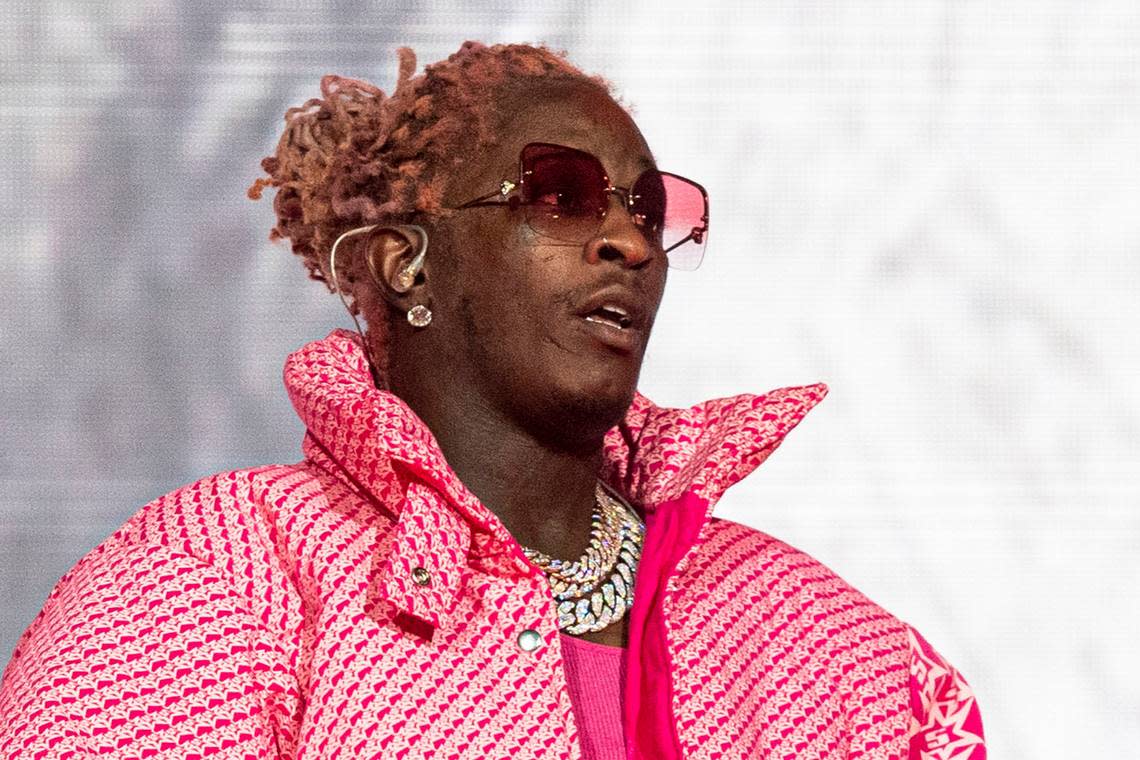Can song lyrics be used as evidence in NC? What to know amid Young Thug RICO trial

- Oops!Something went wrong.Please try again later.
During Young Thug’s RICO trial in Atlanta last week, the rapper’s 2014 track “Lifestyle” was presented as evidence for the jury to hear.
Young Thug, whose real name is Jeffrey Williams, is accused of running a “criminal street gang” called YSL, which stands for Young Slime Life or Young Stoner Life, The Guardian reported. Members of the alleged gang have been charged with murder, carjacking and other alleged crimes.
Though the song was played to bolster Williams’ defense, the use of lyrics in criminal trials has become a subject of debate after the judge presiding over the case ruled that the prosecution could use lyrics from other songs to present their case, ABC News reported.
In his argument after the ruling, Williams’ attorney Brian Steel said prosecutors violated his right to free speech, while prosecutors said the lyrics were being used “to prove the nature of YSL as a racketeering enterprise,” ABC News reported.
Outside of Georgia, at least two states are moving to ban the use of song lyrics in criminal trials.
In 2022, California Gov. Gavin Newsom signed a law that limits the use of song lyrics as evidence in court, USA Today reported. New York lawmakers are working to pass a similar law, which has garnered the support of rappers Jay-Z and Meek Mill.
But could song lyrics be used as evidence against a defendant in North Carolina? Here’s what to know.
Can song lyrics be used as evidence in North Carolina?
Song lyrics can be used as evidence against a defendant in a criminal case in North Carolina if the lyrics are similar to the “facts of the charged offense,” according to UNC School of Government Professor Jeff Welty.
In the unpublished case of State v. Allen in 2006, lyrics written by a defendant who was slated to stand trial for murder were admitted after the “court found the lyrics sufficiently similar to the facts and circumstance surrounding the murder,” Welty wrote.
Three years later, in State v. Bryant, police found a notebook from a murder suspect that contained “rap lyrics the defendant had written about the shootings,” which were later admitted into evidence, according to Welty.
While song lyrics can be used as evidence in criminal cases, North Carolina law prevents the use of evidence “if its probative value is substantially outweighed by the danger of unfair prejudice.”
Could using song or rap lyrics in trials lead to bias?
Studies indicate that juries are more likely to convict if they are shown song lyrics from a defendant that are considered to be violent.
In a study published in 1999, participants were given a a hypothetical description of an 18-year-old Black male accused of murder, but only some were shown lyrics written by an actual murder defendant, according to the New Jersey State Bar Foundation.
The study concluded that those who were shown the lyrics were more likely to think the person had committed the murder.
More than two decades later, Carrie Fried, conducted an informal study where she typed out the lyrics to a 1960s folk song, “Bad Man Blunder,” NPR reported.
The song opens with: “Well, early one evening I was rollin’ around, I was feelin’ kind of mean, I shot a deputy down.”
During the study, some participants were told the song was country, while others were told the song was rap, NPR reported.
“When subjects thought the song was a rap song or when they associated it with a Black artist, they were significantly more likely to say this poses a danger,” Fried told NPR.
Federal efforts to protect creative freedom
The Restoring Artistic Protection Act, or the RAP Act, was reintroduced to Congress in April to protect artists and limit the use of their lyrics in court proceedings, Pitchfork reported.
Since 2020, prosecutors in more than 500 criminal cases nationwide have used artists’ lyrics as evidence against them, according to Pitchfork.
The bill currently sits in the House.

